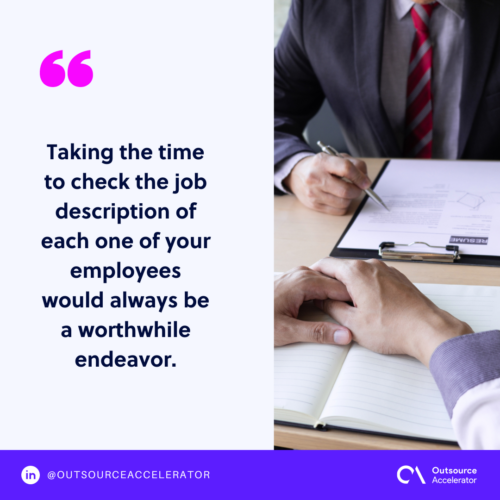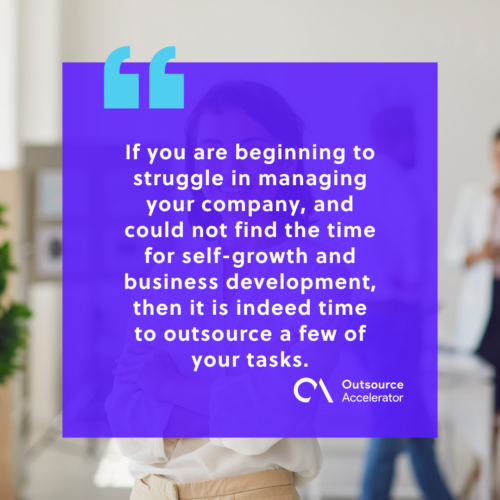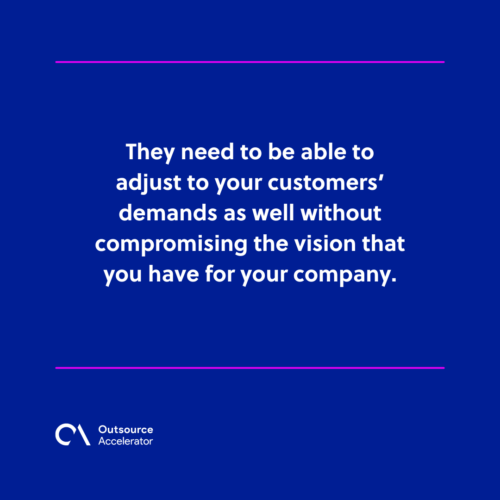How to outsource your business

Hiring an outsourcing service provider enriches any business as it allows a company to save money and become more efficient. Every company has its own expertise, and outsourcing lets you focus on leveraging your team’s own strengths.
There are some significant advantages to gain when paying others to lend their knowledge and skills to your business. In essence, letting others do what you cannot do better is what outsourcing is all about.
Before delving deeper into the topic, here are a few necessary things to know about business process outsourcing (BPO) that you may find useful as you read on. A question more commonly asked is, outsourcing is when a company does what?
How does outsourcing work?
Outsourcing is the process of contracting a third-party to carry out tasks that were initially performed in-house by your employees. It is usually a cost-cutting business strategy that allows you to allocate more of your time and resources to your company’s core competencies.
It includes both local and foreign hiring, which could also mean establishing a separate infrastructure in a different country. This is otherwise known as offshoring. Offshoring is different from outsourcing in the sense that a business can outsource without having to go offshore.

Contrary to insourcing, which is typically done by a third-party within a company’s premises, outsourcing is implemented in the service provider’s office or building.
Understanding a little bit about what it means to outsource jobs would help a lot while reading this article. Now that you know these necessary things, here are the how’s and when’s of hiring an outsourcing service for your business.
| Part I | Before you start outsourcing your business |
| Part II | How to outsource your business |
| Part III | Is now the right time for you to start outsourcing? |
| Part IV | Outsourcing checklist: how ready are you to outsource? |
Part I: Before you start outsourcing your business
The first part of this paper discusses some of the steps you need to take before hiring an outsourcing service company. It is essential to think about these things first before deciding to continue with the process.
Merely hearing about the meaning of outsourcing services and benefits is not enough to fully dive into this valuable practice. You must first assess yourself and your team before making any conclusion.
Preparation is crucial, and the steps below would guide you to make the right choices. Following these steps will allow you to make the most out of the benefits gained from outsourcing your business. They would also help you avoid the trial-and-error stage that could lead to a lot of unnecessary expenses.
Identify the roles and responsibilities of your employees
The first thing to do is to identify and examine the roles and responsibilities of all your existing employees. Assess whether or not anyone could still cover the tasks you are planning to outsource.
This could be a meticulous step that may require a lot of your attention. Any misinterpretation may cause tension within your team.
Multi-tasking is a common practice in the modern corporate world. Rarely does one employee perform only a single task in the office. This is an advantage for employers as they gain extra savings by not having to hire someone else.
However, filling your employees’ table with more than what they could handle has a lot of drawbacks as well. This is where business processing outsourcing comes in.
At first, a lot of your company’s non-core functions could still be accommodated by some of your staff members. This gives you the opportunity to delay your major outsourcing plan.
For example, one of your machine operators may also be well-versed when it comes to the latest IT practices. Thus, he could also be assigned as the primary IT troubleshooter for some of the minor computer issues in your office.
Initially, it could be great. But as your business grows, so does the responsibilities of each of the members of your team.
In the said example, there will come a time when that particular machine operator may already be burdened by the bulk of his work and his other responsibilities. Adding another side task like fixing computers may eventually make him inefficient in accomplishing his primary function.
Ultimately, this dilemma would not be suitable for your company. As a business owner, you should know that employee health and satisfaction is also a crucial factor in maintaining a business’ success.
Taking the time to check the job description of each one of your employees would always be a worthwhile endeavor. Understanding the load of each of your team members allows you to adjust and make decisions for the welfare of all stakeholders.
If you think that everyone is already too preoccupied with numerous work functions, then it could be time to outsource some of the less critical tasks.
You may ask, what is the work of BPO companies? They help you relieve your employees of non-core tasks that are within the service provider’s area of expertise. This is how the BPO industry works, and you should take advantage of it.
There is a two-fold benefit that you can get from outsourcing:
- You maintain the high morale of your team as they could focus on the primary work you assigned them to do.
- You get peace of mind by letting a team of specialists handle those minor tasks that are also important for the welfare of your business.
First, understand your employees’ roles and the weight of their current responsibilities. Then you can arrive with a better and more sensible decision for your company moving forward.

Identify your vendor: know the services using the BPO directory
The next step after understanding what it means to outsource and assessing your team’s current strength is to learn more about the BPO industry.
A particular area to ponder is the different kinds of services BPO companies offer to their clients. This is mainly done by checking BPO directories online based on your company’s specific niche.
BPO has become so wide-ranging these days that it presents various opportunities to businesses who need help in any particular field. Outsourcing was initially associated only with the manufacturing industry when BPO firms helped in many parts of the supply chain.
Today, outsourcing has grown to cover many other industries, including automotive and industrial, IT, banking, capital markets, energy, technology, communications and media, travel, and a lot more.
Even in the areas of health, public service, utilities, and retail, outsourcing for business development have become the trend. Identifying your vendor also means listing down a set of standards you want a specific BPO firm to demonstrate before you hire them.
Before writing these criteria, the very first question you need to ask yourself is why are you going to outsource? This question will be better answered once you finished step 1 as explained above.
You need to be clear about your purpose. You need to formulate a well-defined set of goals before you can list down your expectations on an outsourcer.
Aside from setting goals, you should also clearly define your business’ unique core values and attributes. It is not enough to only know what outsourcing is in business, but more importantly, how can it effectively support your company in terms of fitting in with your team’s own culture and purpose.
Each company has its distinctive characteristics. Yours have it, too. Finding the right vendor means hiring one that can seamlessly adapt to your principles and philosophies. You don’t want a third party entity to taint the brand you have worked hard for all these years.
After creating these sets of standards or criteria, it is now time to invite the vendors you have prequalified during research. Send each one a formal letter of invitation, which includes a request for information (RFI) regarding the BPO company’s list of expertise.
Upon meeting up with each vendor, tell them your purpose, goals, and objectives. This is the perfect avenue to state all of your expectations before coming up with a final decision. You should be in control of the meeting, and you must be able to communicate what you want clearly.
Very often, vendors take the lead in these kinds of meetings. They present all of their plans and strategies on how a company works, but forget to establish the needs of the client. Indeed, there is a time for that, but let them know and understand your agenda first before they suggest any ideas or opinions.
Of course, you also have the option to hire multiple vendors that would handle different functions. But contracting just one service provider would lessen your costs.
Finally, before making your final selection, do not forget to investigate and do more research on your vendor of choice. Find out if all their answers to your questions are valid. Seek service reviews online and discover their track record.
Find some of their former and current clients. Ask about the outsourcing firm’s services and the results they are getting. Are they effective? Do they bring your desired results? Are they easy to get along with?
This part of the process will allow you to make a proper estimate of whether the vendor will fit into your company’s culture or not. If the result of your final investigation is positive, then it is time to draft the contract between you and the chosen outsourcing group.
In summary, here are the steps to identify your vendor:
- Search the Outsource Accelerator BPO Directory for qualified service providers in your niche.
- List down a set of standards you expect from these BPO firms based on your company’s mission, vision, and core values.
- Invite each of the vendors for a meeting. Here, you can state all of your goals and expectations. Ensure that each vendor clearly understands what you need.
- Make a final background check of your vendor of choice. If it turns out great, then finalize by signing a contract with them.

Consult and seek advice from the experts on the field
If you are still confused about how to prepare for outsourcing, then it is wise to seek advice from a professional.
While this guide enlightens you with the basics of outsourcing, there is still a lot more to learn. Closely working with an expert to direct you every step of the way prevents wasted time, energy, and resources.
A consultant provides expert advice on the specifics of outsourcing. From the beginning of the process, up to its implementation, and even beyond completion.
Hiring one would help you understand all you need to know, from what does outsourcing mean and what do BPO companies do, to guidelines on how to do outsourcing jobs.
Another benefit of hiring an outsourcing consultant is having access to unbiased, autonomous information and opinions about the industry. These experts provide all the know-how, tactics, and customized assistance that your business uniquely needs to outsource successfully.
Outsource Accelerator consultation
One of the fastest growing outsourcing consulting firms right now is Outsource Accelerator (OA). The company offers unprejudiced resources and professional appraisal of outsourcing options in the Philippines.
Aside from being an outsourcing consultant, OA also features a comprehensive outsourcing directory, with over 500 BPO companies listed. OA covers almost all of today’s industries and recommends BPO service providers that suit all your business needs.
OA focuses on startup projects and small to medium-sized businesses. These smaller types of companies typically have 2,000 employees at the most. Proper consultation has helped a lot of these businesses, particularly those in the Western markets, to reduce high labor costs through outsourcing.
Part II: How to outsource your business?
The details of how to outsource and the timing of doing it are going to be discussed from this point on.
After assessing your company’s needs and the status of your employees, you might already be convinced that outsourcing is the next best step for you. You may also have made a shortlist of potential BPO service providers to choose from once you begin implementing your plan.
Moreover, you may have made up your mind to hire an outsourcing consultant as well. This means that the only remaining step is to begin. Below are ten tips on how to do it effectively.
Essential things to consider before you start outsourcing
1. Identify your initial budget or business capital
A necessary thing to do before you start outsourcing is to set a specific budget for it. You should not dive into the practice without even having an estimate of how much it would cost you to implement it.
Identifying your business capital allows you to know what your limits are when negotiating with potential vendors. Naturally, you would want to get the most reasonable price available as one of the primary objectives of outsourcing is cost-cutting.
Do not forget to ask your potential vendors about their pricing schemes. Take advantage of their available terms. Costs should be discussed during your meetings before the signing of the contract. While the price is certainly not the ultimate factor, preparing a budget and sticking to it is still essential.
2. Check the political stability of the country
You may be surprised that looking at a country’s current political standing is included in this list. The political stability or instability of the country where you will outsource is vital.
This is because the country’s political stability is directly linked to economic stability as well. In other words, the more reliable the government of a country is, the safer it is to invest in outsourcing there.

3. Set up your business expectations ahead of time
Establishing your business expectations before talking to a vendor is crucial because you want to be quite clear of the direction where you want to go before anyone else provides any inputs.
For example, as mentioned in the job outsourcing definition discussed above, outsourcing could also include offshoring. If this is the area you want to go, then determine that probability as early as possible.
Do not forget to brief your team leaders about it before moving forward. Moreover, allow yourself to not expect too much from your employees and the outsourcing service provider.
Outsourcing is a process, and like all processes, it has a learning curve both for your team and the BPO group.
4. Know your business benchmark methodology and ratio calculations
This is another crucial thing to consider to appreciate what a BPO does. It is important to note that not all service providers are created the same.
This is especially true in terms of their capacity to cover all your outsourcing needs. Some are the right size to cover all your bases. Others are perhaps too big for your startup that they may eventually sub-contract you to a smaller provider.
There is this thing called “Potential Return on Time Invested” or PROTI. This should be a consideration when negotiating with a potential outsourcer. In fact, the best outsourcing firms make use of this concept.
5. Get ready to act up against talent dilution
This is a potential issue in any outsourcing country. You must be well aware of this and make a plan on how to manage it. For example, there are 1.3 million BPO employees in the Philippines right now.
According to reports, around a quarter of a million people are being employed in the outsourcing industry of the country each year. With that level of influx, there will come a time when the level of talent available would become thinner.
As mentioned in the definition of outsourcing jobs, you would want a third party to help you improve your business with high-level talent and not with mediocre ones. Again, having your own set of standards and preparing your expectations ahead of time would help mitigate this problem.
6. Ensure that communication avenues are at bay
Check if the outsourcer has enough technical proficiency to cater to the needs of your business. This is crucial especially if you consider how an IT company works. Prompt and precise communication is needed when managing information.
A single delay or unsent data could cause a lot of trouble for the organization and its clients. One tip on how to outsource IT services: make sure the outsourcer has the right equipment and systems in place to implement smooth communication in all areas of the job.
7. Check for the infrastructure problems and issues in the site
This one is related to the last tip. Another potential problem that could come when outsourcing is the capacity of the outsorcerer’s office or building for continuous service. Visit and check their existing infrastructure.
In the same example above regarding IT firms, several uninterruptible power supply (UPS) or generators should be in place to ensure continuous power. Considering what the work of IT companies is, your chosen outsourcer should also have a backup internet service provider in case their main one shuts down.
8. Prepare a reputation management for your handlers
Create a team that would handle not only the reputation of your own company but also that of your chosen outsourcer. Many customers do not know anything about outsourcing.
Most of the time, they unknowingly equate the service they get from your outsourcers with your brand.
This is why it is important to manage reputation, especially in today’s social media age. It is so easy for anything to go viral, and for people to believe it, even without having the correct source.
With the high attrition rate correlated with outsourcing, it is highly possible for a former employee to say something bad about a BPO company after working there. Someone has to handle these for your own company and the outsourcer you are working with.

9. Study and consider the attrition level of the account
This tip is related to the previous number as well. As mentioned before, attrition level is usually high for outsourcing. This high turnover rate could cause preventable troubles when adequately managed.
When you look at the meaning of outsourcing company tasks, it is clear that the practice involves a third party. It should also be apparent to the public that the high attrition of your outsourcer is not in any way related to how you run your own company. You can also always check your chosen provider’s actual attrition level before hiring them.
10. Prepare and scheme your plan about the pricing value
Again, as mentioned in the “what is job outsourcing” part of this paper, one of the main purposes of outsourcing is to generate savings by lowering labor costs. You need to negotiate a reasonable price with a potential outsourcer that would be a win-win situation for both sides.
Coming up with the appropriate price would require you to study the flow of your business’ finances. Then, plan about the pricing value according to your findings.
Part III: Is now the right time for you to start outsourcing?
After learning about how to begin outsourcing, the next step is knowing the right time to implement it. Recognizing when is the appropriate time would most likely lead to better results than just diving into it haphazardly.
In determining the proper timing, you must be sensitive about that exact point in time when you already need to outsource. How would you do that?
How will you know that you need to outsource your business?
The first thing to do before deciding when to start outsourcing is to make a cost-vs-time analysis for the specific task or tasks you are planning to contract out.
For instance, you want to upgrade one of the software used in your daily operations. There may be two or three of your existing employees that could handle this job, but they would have to work on it after regular office hours.
This situation calls for spending money on overtime pay. Also, it is not certain how many days or weeks it is going to take for them to finish the said upgrade.
Calculate the cost of overtime pay multiplied by an estimated number of days. Do not forget to factor in overtime meals, transportation allowances, and other benefits your company provides for employees who render overtime. Include everything in the final cost.
Compare this value to how much you are going to spend when having to hire a third-party. Keep in mind that you do not have to offer third-party providers the same benefits you give to your employees.
This comparison will help you decide if it is time to outsource or not.
Another way to know that you need to outsource if by figuring out the scale of a specific task or project. One-time projects that are urgent may require to hire a third-party service to finish according to your schedule.
An example of this is if your company is trying to build your website. Some of your team members may know how to do it. But it might take them a considerable amount of time to finish because they cannot leave their main tasks. Outsourcing then becomes the answer.
As also mentioned in the “what is outsourcing jobs definition” part above, outsourcing lets your employees focus more on the work you hired them to do. When their main function is compromised, then it is a clear indication that you already have to outsource.
When is the best time to start outsourcing your business?
Perhaps the apparent time to start outsourcing is when you and your staff are already burned out because of overwork. Moreover, if business operation and profit are already affected by it, then contracting would become a necessity.
You do not have to wait before that happens to begin the process of outsourcing. There are many ways to find out when the right time has come before a business disaster occurs. Below are a few signs that your business already needs outside help.
- You are stressed by so many things that you need to take care of to keep your business running.
- You feel like every day there are not enough hours to complete all your work.
- You feel like you are so busy doing all that you can, in the best way that you can, and still, nothing is moving forward.
- You need more time to relax and unwind because you are already having health issues.
- You have a clear vision for your company and have set specific short-term and long-term goals to achieve it, but you do not know how to accomplish them.
If you are beginning to struggle in managing your company, and could not find the time for self-growth and business development, then it is indeed time to outsource a few of your tasks.
A business in “growth” condition would more likely succeed as compared to one that is always in “maintenance” condition. Make sure your company is always growing by taking advantage of outsourcing.

Top 10 things that you need to prepare and consider when outsourcing
You now know how to determine if it is time to outsource. You also know the right timing to do it. Next, here are ten things to set up and think through before starting the process.
Clear understanding of you and your own team’s workload
As mentioned in Part I of this paper, identifying the roles and responsibilities of both you and your staff is essential before deciding to outsource. However, it is not just about identifying.
It is about having complete awareness of your workload and that of each of your employees as well. Not many business owners even consider this as they are thinking about the financial bottom line most of the time.
You should realize that the employees’ morale is crucial to a company’s success. If you take care of your team members, they would surely take care of your business as well.
Identification of project scope and scalability
Identifying the scope and scale of the project you are planning to outsource is essential. What tasks need to be done right now? Are there any tasks that have a prerequisite and could be finished later? Could there be redundant tasks that should not have been included in the project at all?
These are some questions to ask yourself before outsourcing. Realize that some tasks are urgent while others may wait for a later time. You can choose to outsource only the important ones to save money.
Prepare an official written document that identifies the scope and scale of a given project for future reference.
Final budget, milestones deadline, and success criteria
The estimated budget and final budget are not the same most of the time. Typically, you allow some excess when approximating. However, you should also not be too stringent and hold back that the budget becomes impractical.
The key is to be realistic when determining the final budget. Further explore and investigate the ways you can generate savings. But be sensible that quality products and services have a cost.
Set realistic deadlines as well. Huge projects take time to complete. Realize that no BPO company could finish a 6-month project in just two months. Check that the agreed deadlines should match the projected workload and final budget.
Lastly, internally agree on a set of success criteria ahead of time. You should present this list to your vendor as well. Make sure they subscribe to it before closing a deal.
Shortlist of potential BPO service providers
Search for potential vendors and pare it down to a shortlist of three to four companies. Any more than that would give you a hard time in selecting. Each BPO company has its benefits and drawbacks.
Learn both sides as early as possible to end up with a better decision. Search online and talk to your business contracts to ask for references. Go the extra mile when it comes to research. You will thank yourself later for the effort.
Employee morale and office culture of service provide
When assessing a BPO firm, do not forget to examine its corporate culture and the morale of its employees. It is usually a good sign when a company’s employees are happy. It only means that the outsourcing firm has done an excellent job keeping their workforce in prime condition for optimum performance.
You, as the customer, should be able to benefit a lot from that. It is a huge risk to hire a third party service provider who does not have a culture to excel and finish tasks on time.
During high-pressure situations, would you be able to rely on them to figure things out by themselves, or would they still have to call you to take care of things? If that is the case, then why did you even bother to outsource?
BPO company’s specialization and unique services
It is to choose a vendor that specializes in the task you need to get done rather than hire one that is more of a generic service provider.
For example, hiring an IT company is the wiser choice if you want to build a website or change an existing software system. You would not want to hire an outsourcing firm that also subcontracts their IT needs to another company.
Also, it would be a plus factor if a vendor could provide additional services that they alone could offer.
For instance, aside from providing your required IT support, they could also offer to monitor Key Performance Indicators (KPI) and submit written evaluations according to schedule.
Ability to adjust according to you and your customers’ needs
You need to choose a vendor that has initiative. A team that knows how to fix issues by themselves without having to wait for your instructions.
They need to be able to adjust to your customers’ demands as well without compromising the vision that you have for your company.

Capacity to appropriately receive and respond to customer calls
Phone courtesy should also be a top consideration when selecting your vendor. A quick call to their office would give you a feel of what it is like for your customers to deal with their personnel.
Notice the way they respond to emails as well. Do they sound professional or sloppy?
BPO company should have a success manager in place
Choose a vendor that has a success manager who would be specifically assigned to your business alone. This manager would be your go-to person for all things concerning the outsourcing firm.
You do not need to talk to everyone in your chosen service provider’s team when a crisis arrives. You should only be able to reach one all the time. And it is the manager’s job to let the proper persons become aware of the problem.
Capability to help in talent acquisition and retention
Expert human resource management would be a bonus. Outsourcing sometimes requires new hires to work on new tasks presented by a client.
Your chosen service provider should be able to recruit their talent without asking for additional payments. They should also be able to keep their team members happy and retain them until their contract with you is done.
Part IV: Outsourcing checklist: how ready are you to outsource?
Creating your own outsourcing checklist is a great way to keep track of your milestones before implementation. It would also help you organize your thoughts while going through the process.
There is also a checklist called “Request for Proposal” or RFP. RFP is a list of the scope of works and responsibilities you want your outsourcer to produce.
Some companies use a pre-made checklist template to send to their potential vendors. Then they would just sit down, wait for the service providers to respond with their proposed price, and choose the lowest. This is a huge mistake.
Preparing your checklist means it is custom-made for the specific needs of your business that you want to deal with. You will then realize that the hours spent in crafting an accurate, well-thought-out checklist will not go to waste after you experience the results.
Start your outsourcing journey today
Having fundamental knowledge on the how’s and when’s of outsourcing is an excellent advantage before you begin the actual process. This paper has provided you with a lot of information.
However, nothing beats the presence of an outsourcing consultant like Outsource Accelerator to ensure that you are on the right track. Outsource Accelerator can help you find the best outsourcing service company that would meet your exact requirements.
More from Outsource Accelerator: Read more about the myths and misconceptions of outsourcing here







 Independent
Independent




